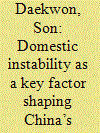|
|
|
Sort Order |
|
|
|
Items / Page
|
|
|
|
|
|
|
| Srl | Item |
| 1 |
ID:
191564


|
|
|
|
|
| Summary/Abstract |
This article investigates the linkage between Kim Jong-un’s power consolidation and Pyongyang’s abrupt return to the denuclearization negotiation table in 2018. It argues that behind Pyongyang’s turnabout lie the three unstable pillars of the Kim family’s rule: a faithful winning coalition, the juche ideology, and Chinese patronage. Upon taking office in 2011, Kim had to debilitate his father’s winning coalition to consolidate his power. With the winning coalition enervated, Kim could not expect its willingness to suppress the masses were they to develop into an ejectorate, and therefore introduced market reforms to secure the people’s support. The reforms, in return, inevitably eroded the ideological appeal of the Kim family, thereby rendering his hold on power more vulnerable to economic pressure. Under such circumstances, Chinese patronage increasingly faltered. It is due to the instability of these three pillars that Kim Jong-un returned to the negotiating table.
|
|
|
|
|
|
|
|
|
|
|
|
|
|
|
|
| 2 |
ID:
171080


|
|
|
|
|
| Summary/Abstract |
This study explores the domestic determinants of China’s intervention in the Korean War. Since the war, scholars have produced a large number of studies on the motivations behind China’s intervention in the war. These previous studies paid scant attention to domestic aspects, all of them assuming, albeit implicitly, that Party leaders could readily harness all available domestic resources and devote them to their political ends and that the public was willing to sacrifice their material resources and lives in order to satisfy the leaders’ political goals. By contrast, this study, based on extensive newly unearthed archival documents, argues that very unfavorable domestic circumstances helped shape the CCP’s strategy both before and after the outbreak of the Korean War. The domestic challenges not only provided the rationale for the CCP’s opposition to Kim Il-Sung’s Korean War plan before June 1950 but also gave an internal impetus for China’s vacillation in decision making and affected Mao’s final proactive decision to enter the war in October 1950.
|
|
|
|
|
|
|
|
|
|
|
|
|
|
|
|
| 3 |
ID:
193638


|
|
|
|
|
| Summary/Abstract |
It is widely noted that China maintains a “special relationship” with North Korea, which is best epitomized by the Sino-DPRK Treaty of Friendship, Cooperation and Mutual Assistance that the two countries signed in July 1961. However, in the post-Cold War era, the raison d’être of this alliance treaty has been challenged. Against this backdrop, this paper traces China’s evolving interpretations of the Sino-DPRK friendship treaty. By investigating the process behind the signing of the treaty, it argues that Beijing signed an “alliance treaty” with Pyongyang to win over the latter in the context of the Sino-Soviet split. However, as China sought to improve its relations with Western powers, the Sino-DPRK friendship treaty became increasingly burdensome to Beijing. Thus, Beijing began to dilute the alliance nature of the treaty by no longer publicly affirming its security obligation toward Pyongyang. After Deng Xiaoping came to power in China, the treaty was found to be incompatible with Beijing’s newly promulgated foreign policy principle of non-alignment. To address this problem, Beijing ultimately reformulated the nature of Sino-DPRK relations and reinterpreted the Sino-DPRK friendship treaty—that is, China is not an ally of North Korea, and the Sino-DPRK friendship treaty carries only symbolic meaning without casus foederis. Based on these analyses, this paper claims that the security obligation of the Sino-DPRK friendship treaty is no longer functional.
|
|
|
|
|
|
|
|
|
|
|
|
|
|
|
|
| 4 |
ID:
160350


|
|
|
|
|
| Summary/Abstract |
This paper seeks to find an answer to the question of why China’s effort to curb
North Korea’s nuclear development has failed to produce expected outcomes.
Since the second North Korean nuclear crisis in 2002, China, as the most, if not
sole, influential country to North Korea, has been attempting to restrain the North’s
nuclear armament. Nevertheless, Beijing has always failed to sustain its pressure
on Pyongyang long enough to restrain Pyongyang’s nuclear ambition; instead, it
has often ended up with China’s appeasement policy. Witnessing such failure, some
scholars assert that Beijing is able, but not willing, to curb Pyongyang’s nuclear
armament, while others claim that Beijing’s leverage over Pyongyang is a lot
more limited than widely thought. Yet, both schools of thought, focusing narrowly
on China’s capability or willingness to restrain North Korea, has failed to depict
a full picture. By contrast, this study, employing a game theory approach, views
Sino–DPRK relations as a strategic interaction between restrainer and restrainee.
It argues that North Korea’s tactical deception and military adventurism shuffle
China’s political priorities on the Korean peninsula, thereby preventing China from
pressuring North Korea.
|
|
|
|
|
|
|
|
|
|
|
|
|
|
|
|
|
|
|
|
|